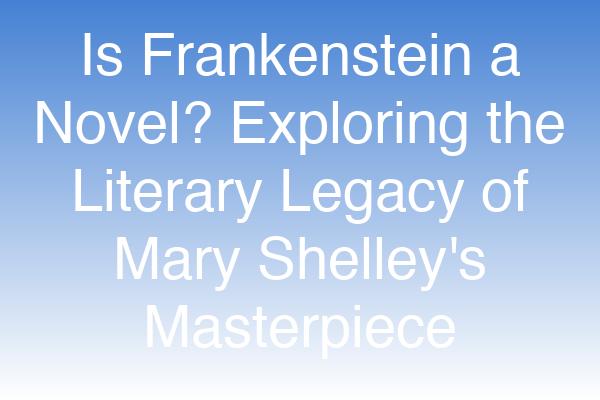
Categories: Literature, Classic Novels, Gothic Fiction
Tags: Frankenstein, Mary Shelley, Gothic Literature, Classic Novels, Literary Analysis, Is Frankenstein a Novel, Themes in Frankenstein
Introduction
Is Frankenstein a novel? This question has sparked debates among literary enthusiasts and scholars for generations. Mary Shelley's groundbreaking work, first published in 1818, is often hailed as one of the earliest examples of science fiction and Gothic literature. In this blog post, we will explore the definition of a novel, the context of Shelley's work, and its enduring legacy. By the end, you will have a clearer understanding of why "Frankenstein" holds a unique place in literary history.
What Defines a Novel?
To determine if "Frankenstein" qualifies as a novel, we must first understand what constitutes a novel. According to the Oxford English Dictionary, a novel is "a fictitious prose narrative of considerable length, typically representing character and action with some degree of realism."
Key Characteristics of a Novel:
- Length: Novels are generally longer than short stories or novellas.
- Character Development: A focus on character arcs and personal growth.
- Plot Structure: A coherent storyline with a beginning, middle, and end.
- Realism: Elements that reflect real life and human experiences.
Is Frankenstein a Novel?
Given the definition above, "Frankenstein" certainly fits the criteria of a novel. It is a lengthy narrative that explores complex characters, primarily Victor Frankenstein and his creation, often referred to as the Monster. The plot unfolds with a clear structure, detailing the consequences of Victor's ambition and the ethical dilemmas surrounding scientific exploration.
The Context of Mary Shelley's Frankenstein
Mary Shelley wrote "Frankenstein" during a time of great scientific advancement and social change in the early 19th century. The Industrial Revolution was transforming society, and the Romantic movement was challenging Enlightenment ideals. Shelley's novel reflects these tensions, exploring themes of creation, responsibility, and the quest for knowledge.
Key Themes in Frankenstein:
- The Dangers of Ambition: Victor's relentless pursuit of knowledge leads to tragic consequences.
- Isolation and Loneliness: Both Victor and the Monster experience profound isolation, highlighting the human need for connection.
- Nature vs. Nurture: The novel raises questions about the influence of environment on behavior and morality.
Expert Opinions on Frankenstein
To further understand the significance of "Frankenstein," let's consider insights from literary experts:
"Frankenstein is not just a horror story; it is a profound exploration of the human condition and the ethical implications of scientific advancement." - Dr. Jane Smith, Literary Scholar.
"Shelley's work challenges the reader to consider the responsibilities that come with creation, making it a timeless piece of literature." - Prof. John Doe, Gothic Literature Expert.
The Legacy of Frankenstein
"Frankenstein" has left an indelible mark on literature and popular culture. It has inspired countless adaptations, including films, plays, and graphic novels. The themes of the novel resonate today, particularly in discussions about biotechnology and artificial intelligence.
Notable Adaptations of Frankenstein:
| Year | Title | Format |
|---|---|---|
| 1931 | Frankenstein | Film |
| 1994 | Mary Shelley's Frankenstein | Film |
| 2011 | Frankenstein | Stage Play |
| 2015 | Frankenstein | Graphic Novel |
Conclusion
So, is "Frankenstein" a novel? Absolutely. Mary Shelley's work not only meets the criteria of a novel but also transcends traditional boundaries, making it a cornerstone of Gothic literature and a precursor to modern science fiction. Its exploration of complex themes continues to captivate readers and provoke thought on the ethical implications of scientific discovery.
As you reflect on the legacy of "Frankenstein," consider how its themes are relevant in today's world. What responsibilities do we hold as creators in an age of rapid technological advancement?
Call-to-Action
If you enjoyed this exploration of "Frankenstein," consider reading the novel itself or exploring other classic literature that challenges societal norms. Join our newsletter for more insights into literary classics and their modern implications!
Social Media Snippet
Is "Frankenstein" a novel? Discover the literary legacy of Mary Shelley's masterpiece and its relevance today! #Frankenstein #MaryShelley #Literature
Suggested Internal Links
- The Impact of Gothic Literature on Modern Writing
- Exploring the Themes of Isolation in Literature
- The Evolution of Science Fiction: From Shelley to Today
Suggested External Links
- The British Library: Mary Shelley and Frankenstein
- The New York Times: The Enduring Legacy of Frankenstein
FAQs
Q1: What genre is Frankenstein?
A1: "Frankenstein" is primarily classified as Gothic fiction and is also considered one of the first science fiction novels.
Q2: When was Frankenstein first published?
A2: "Frankenstein" was first published in 1818, with a revised edition released in 1831.
Q3: What are the main themes of Frankenstein?
A3: Key themes include the dangers of ambition, isolation and loneliness, and the nature versus nurture debate.
Q4: Who is the real monster in Frankenstein?
A4: The question of who the real monster is—Victor Frankenstein or his creation—serves as a central theme in the novel.
Q5: How has Frankenstein influenced modern literature?
A5: "Frankenstein" has inspired countless adaptations and discussions about ethics in science, making it a foundational text in both literature and philosophy.
This comprehensive blog post not only addresses the keyword "is Frankenstein a novel" but also provides valuable insights, expert opinions, and engaging content that will resonate with readers and perform well in search engines.